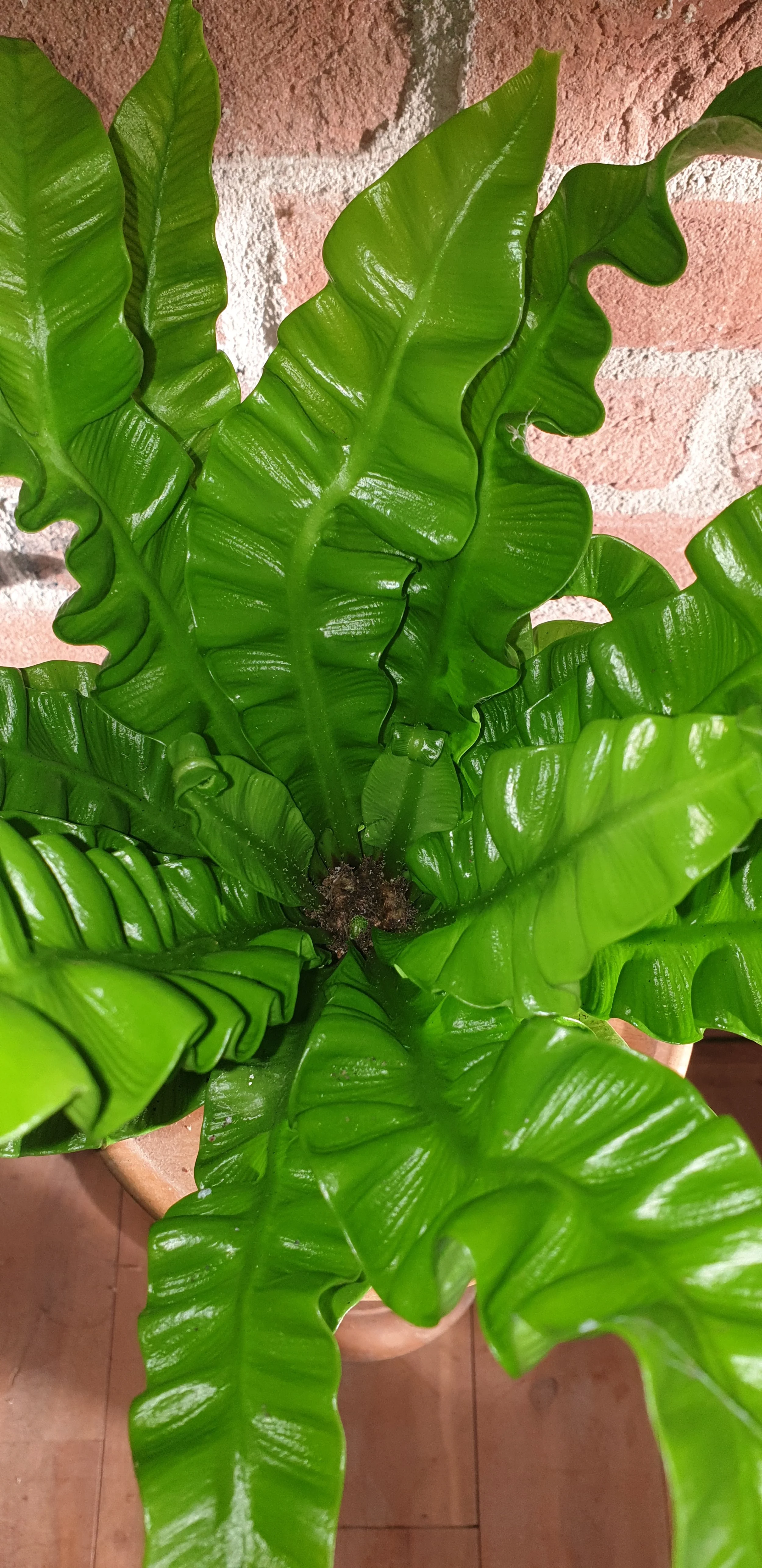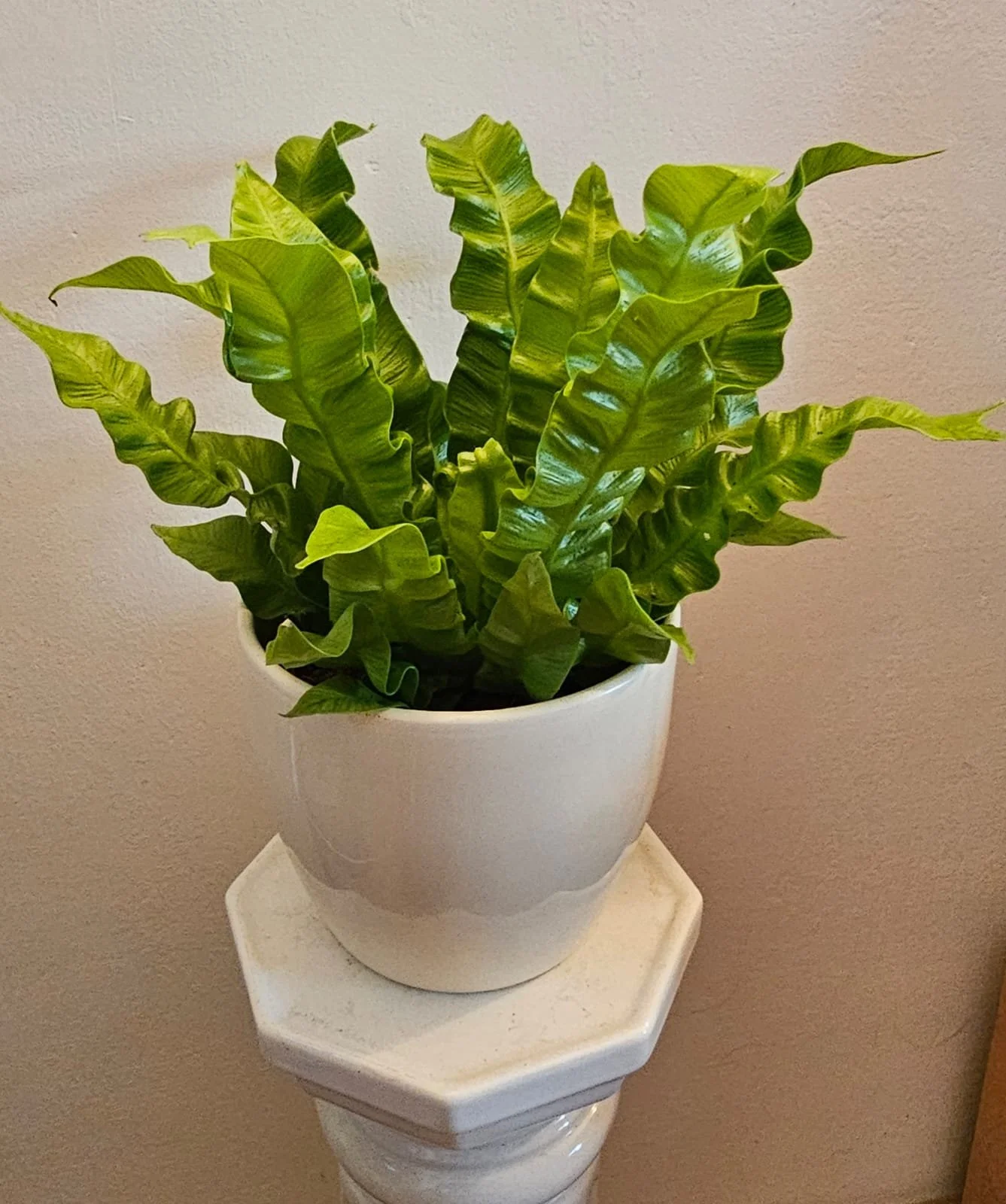 Image 1 of 2
Image 1 of 2

 Image 2 of 2
Image 2 of 2



Asplenium nidus 'Crispy Wave' in 12cm pot
Asplenium 'Crispy Wave' is a striking cultivar of the bird’s nest fern (Asplenium nidus), known for its crinkled, upright fronds that form a symmetrical, vase-like rosette. Native to tropical Asia and Polynesia, this fern brings a lush, jungle-like feel to any space.
✅ Key Features:
Foliage: Thick, glossy, bright green fronds with wavy, ruffled edges, resembling rippling leaves or curly ribbons.
Growth Habit: Forms a dense, upright rosette (or “nest”) of fronds; can grow 1–2 feet tall and wide indoors.
Air Purifying: Known for its ability to improve indoor air quality.
Low Maintenance: Easier to care for than many ferns due to its thicker, sturdier leaves.
---
🪴 Asplenium 'Crispy Wave' Care Guide
This fern is relatively easygoing when its tropical needs are met—think warmth, humidity, and moisture.
☀️ Light
Prefers bright, indirect light.
Can tolerate medium to low light, but avoid direct sunlight, which can burn the fronds.
Ideal near a north or east-facing window, or behind sheer curtains.
💧 Watering
Keep soil evenly moist, but not soggy.
Water when the top 1 inch of soil feels dry.
Avoid watering directly into the central rosette (“nest”)—this can cause rot.
Use room temperature, filtered water if your tap water is hard or chlorinated.
🌡️ Temperature & Humidity
Temperature: 60–80°F (16–27°C). Do not expose to temps below 55°F (13°C).
Loves high humidity (50–70%+).
Use a humidifier, group with other plants, or place on a humidity tray.
A bathroom or kitchen with filtered light can be ideal.
🌱 Soil
Use a well-draining, airy potting mix that retains some moisture.
Ideal mix: 2 parts peat or coco coir + 1 part perlite or orchid bark.
🌸 Fertilizing
Feed monthly in spring and summer with a diluted liquid houseplant fertilizer (half strength).
Do not over-fertilize—too much can burn roots or distort new growth.
Skip feeding in fall and winter.
🪴 Repotting
Repot every 2–3 years or when rootbound.
Choose a pot 1–2 inches wider, with good drainage.
✂️ Pruning & Maintenance
Remove dead or damaged fronds at the base with clean scissors.
Wipe leaves gently with a damp cloth to remove dust.
❌ What to Avoid
No direct sunlight
No water in the center rosette
No dry air or drafts
No soggy soil
🐛 Common Problems
Brown frond edges: Often due to dry air or underwatering.
Yellowing leaves: Overwatering or poor drainage.
Pests: Rare, but watch for scale, mealybugs, or fungus gnats.
---
🐾 Pet Friendly?
✅ Yes! Asplenium 'Crispy Wave' is non-toxic to pets and humans.
---
🧘 Bonus Tip:
Because of its upright shape and compact footprint, the Crispy Wave is great for small spaces, shelves, and even terrariums. Just keep it away from heaters or AC vents.
---
Asplenium 'Crispy Wave' is a striking cultivar of the bird’s nest fern (Asplenium nidus), known for its crinkled, upright fronds that form a symmetrical, vase-like rosette. Native to tropical Asia and Polynesia, this fern brings a lush, jungle-like feel to any space.
✅ Key Features:
Foliage: Thick, glossy, bright green fronds with wavy, ruffled edges, resembling rippling leaves or curly ribbons.
Growth Habit: Forms a dense, upright rosette (or “nest”) of fronds; can grow 1–2 feet tall and wide indoors.
Air Purifying: Known for its ability to improve indoor air quality.
Low Maintenance: Easier to care for than many ferns due to its thicker, sturdier leaves.
---
🪴 Asplenium 'Crispy Wave' Care Guide
This fern is relatively easygoing when its tropical needs are met—think warmth, humidity, and moisture.
☀️ Light
Prefers bright, indirect light.
Can tolerate medium to low light, but avoid direct sunlight, which can burn the fronds.
Ideal near a north or east-facing window, or behind sheer curtains.
💧 Watering
Keep soil evenly moist, but not soggy.
Water when the top 1 inch of soil feels dry.
Avoid watering directly into the central rosette (“nest”)—this can cause rot.
Use room temperature, filtered water if your tap water is hard or chlorinated.
🌡️ Temperature & Humidity
Temperature: 60–80°F (16–27°C). Do not expose to temps below 55°F (13°C).
Loves high humidity (50–70%+).
Use a humidifier, group with other plants, or place on a humidity tray.
A bathroom or kitchen with filtered light can be ideal.
🌱 Soil
Use a well-draining, airy potting mix that retains some moisture.
Ideal mix: 2 parts peat or coco coir + 1 part perlite or orchid bark.
🌸 Fertilizing
Feed monthly in spring and summer with a diluted liquid houseplant fertilizer (half strength).
Do not over-fertilize—too much can burn roots or distort new growth.
Skip feeding in fall and winter.
🪴 Repotting
Repot every 2–3 years or when rootbound.
Choose a pot 1–2 inches wider, with good drainage.
✂️ Pruning & Maintenance
Remove dead or damaged fronds at the base with clean scissors.
Wipe leaves gently with a damp cloth to remove dust.
❌ What to Avoid
No direct sunlight
No water in the center rosette
No dry air or drafts
No soggy soil
🐛 Common Problems
Brown frond edges: Often due to dry air or underwatering.
Yellowing leaves: Overwatering or poor drainage.
Pests: Rare, but watch for scale, mealybugs, or fungus gnats.
---
🐾 Pet Friendly?
✅ Yes! Asplenium 'Crispy Wave' is non-toxic to pets and humans.
---
🧘 Bonus Tip:
Because of its upright shape and compact footprint, the Crispy Wave is great for small spaces, shelves, and even terrariums. Just keep it away from heaters or AC vents.
---